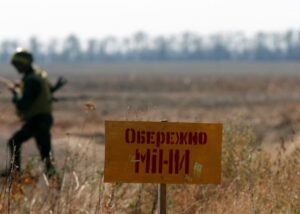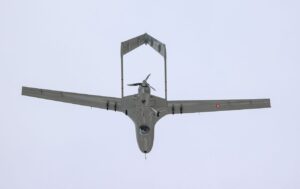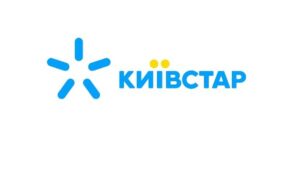Exports of goods in % to the previous period in 2021 and 2022

SSC of Ukraine

The United States will provide Ukraine with $89 million to deploy 100 demining teams, US Ambassador to Ukraine Bridget Brink said.
“Mines, unexploded ordnance, other explosive objects block agricultural land, delay recovery, prevent people from returning home, kill, maim innocent Ukrainians. Therefore, we are providing $ 89 million for Ukraine to deploy 100 demining teams and make the country safer,” – wrote the ambassador on Twitter.

The construction of a plant in Ukraine for the production of Bayraktar strike operational-tactical drones may take several months, and it will be launched in 2023, Ukrainian Ambassador to Turkey Vasily Bodnar predicts.
“Of course, there are some nuances associated with the import of certain equipment and the choice of a company for construction, but these are technical details. I think that in the next month we will see some progress in this matter … The construction itself may take several months, and the launch of the plant (may take place – IF-U) in 2023, perhaps at the end,” he said on the air of the national telethon #UAat once on Monday.
Bodnar recalled that during the visit of Turkish President Recep Tayyip Erdogan to Ukraine on February 3, a corresponding agreement was signed, and a week and a half ago, the Cabinet of Ministers of Ukraine approved it and submitted it to the Verkhovna Rada for ratification.
“In parallel, the owner of the Baykar Makina company acquired a land plot and made a project of the plant itself, and also created a corresponding Ukrainian company, which it registered. It seems to me that, despite the ongoing ratification process, the company is already starting preparatory work in order to start building this plant” – added the ambassador.

Subscribers of the Kyivstar mobile operator with the “Roaming like at home” tariff used 5.256 GB of mobile Internet on average in July and called in roaming for 191 minutes, the company said in a press release.
According to its data, customers of the standard roaming tariff download an average of 201 MB of data per month and talk for 9 minutes, which is 26 and 21 times less than the indicators of the “Roaming like at home” tariff, respectively.
Kyivstar clarified that in general, during the three months of providing the “Roaming like at home” service, the company’s subscribers used almost 32 million GB of mobile Internet and talked at this rate for about 117 million minutes.
As reported earlier, the operators of Ukraine and the EU signed a joint declaration on coordinated efforts to ensure and stabilize affordable or free roaming and international calls between the EU and Ukraine. Kyivstar plans to maintain this service at least until the end of this year.
As Kyivstar President Alexander Komarov recently pointed out in an interview with Interfax-Ukraine, in July the company had about 1.3-1.4 million customers in roaming, and 80-90% used the “Roaming like at home” service, which provided in 30 countries around the world.
Kyivstar in the II quarter of 2022 reduced EBITDA by 4.8% with revenue growth of 3.9% (in dollars – by 2%) compared to the same period in 2021 – to UAH 7.37 billion.
Kyivstar is the largest Ukrainian telecommunications operator. Provides communication and data transmission services based on a wide range of mobile and fixed technologies, including 3G. As of the middle of this year, its services were used by about 24.8 million mobile subscribers and over 1 million fixed Internet customers.
Kyivstar’s shareholder is the international group VEON (formerly VimpelCom Ltd.). The group’s shares are listed on the NASDAQ (New York) stock exchange.

The Turkish Ministry of Defense expects successful loading of grain on two more ships in the sea trade port “Chernomorsk”.
As reported on the ministry’s official Twitter page on Tuesday, the Liberian-flagged OCEAN LION vessel has already departed Chernomorsk with 64,720 tons of corn on board, destined for South Korea.
The ship under the Turkish flag RAHMİ YAĞCI is to deliver 5.3 thousand tons of sunflower meal in bulk from Chornomorsk to Istanbul.
The ministry also said that the inspection of four ships with Ukrainian grain awaiting inspection by the Joint Coordination Center (JCC) will also be carried out in the coming hours.
As reported, on July 22 in Istanbul, at the proposal of the UN, Ukraine, Turkey and UN Secretary-General António Guteres signed the Initiative for the safe transportation of grain and food from the Ukrainian ports of Odessa, Chornomorsk and Yuzhny.

Video hosting YouTube has made it possible to watch videos with automatic translation of subtitles into Ukrainian, said Minister of Digital Transformation Mikhail Fedorov.
“At meetings with Google, we have repeatedly discussed the availability of the company’s services in Ukrainian. In particular, subtitles on YouTube. Now you can watch original content from all over the world with translation into Ukrainian,” he wrote in the telegram channel.
As reported, among 76.6% of Ukrainian citizens who use social networks as a source of information, 66% choose Telegram, 61% – YouTube and 58% – Facebook.
More than 28 million Ukrainian users are registered on YouTube.